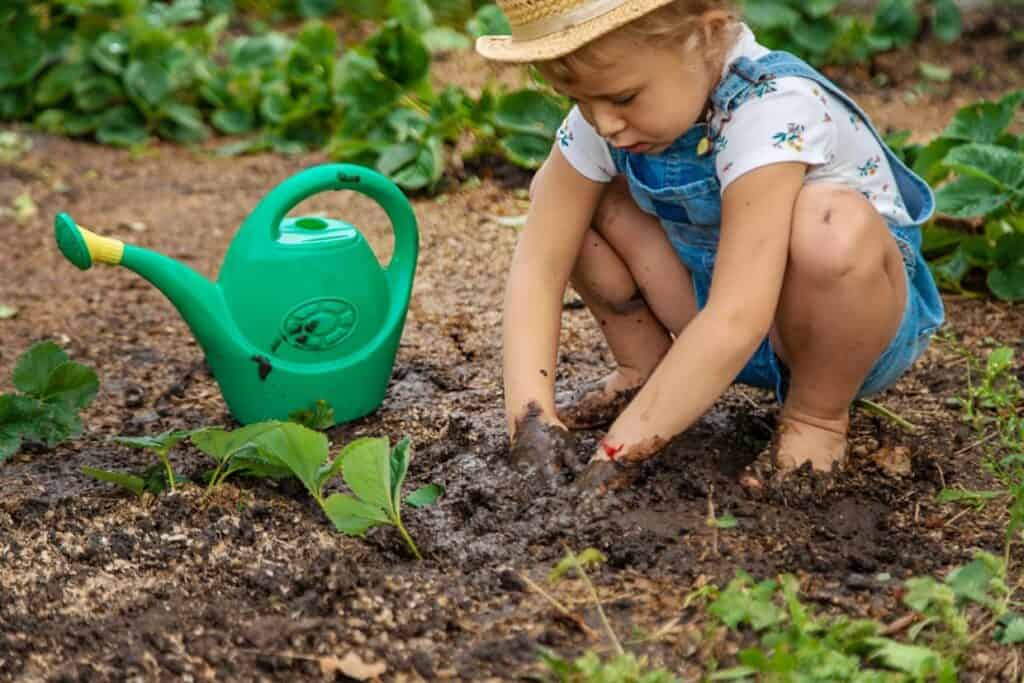For many families, summer means scrambling to secure spots at overpriced and overbooked summer camps. But what’s the alternative? This summer, unlock a hidden gem of an enriching, affordable and downright fun summertime adventure waiting right outside your back door: your very own garden.

Sure, summer camps have their appeal, providing structured activities and social interaction for kids. However, a home garden offers a unique blend of benefits that can nurture a child’s physical, mental and emotional well-being. It’s a blank canvas for imaginative play, a living science lab and a place to create lasting family memories.
Beyond summer camp
In the post-pandemic era, many households have experienced a significant shift in work dynamics, with at least one adult enjoying remote work or a flexible schedule. This newfound arrangement has opened up opportunities for families to rethink traditional summer activities like camps.
Instead of relying solely on organized programs, parents can let their kids loose in the backyard. With a parent working nearby, kids can enjoy the freedom of unstructured outdoor play, all within the safe haven of their own garden.
Planting the seeds of health
There’s more to gardening than dirt under your fingernails. Among many others, a study by Human Kinetics has shown that gardening increases a child’s physical activity. Kneading soil, raking and planting seeds are all fun ways for kids to get exercise and soak up the sunshine, both crucial for physical health.
Turning a forgotten part of the yard into a vegetable garden can work wonders for a child who spends too much time glued to a screen. Even if initially unenthusiastic, your kids will eventually discover the joy of digging in the soil and caring for their tomato plants. Watering their plants, watching them sprout and tracking their growth will become a source of pride. You might even notice your kids requesting veggie egg bites for snacks instead of their usual chips.
But the benefits of gardening extend far beyond the physical. Studies in Clinical Medicine suggest that exposure to plants, green space and particularly to gardening, is beneficial to mental health. If your toddler is prone to meltdowns after preschool, sensory play in the garden might be all they need to relax and unwind.
The garden is also a vibrant classroom. Kids get a firsthand look at plant science, from seed germination to the wonders of pollination. They learn about the food cycle, where their favorite fruits and vegetables come from and the importance of healthy eating habits. Watching a cherry tomato turn from a tiny green bud to a juicy red treat on the vine fosters an appreciation for fresh produce and the effort that goes into growing food.
Letting kids get dirty
Don’t be afraid to let your children get messy. Gardening isn’t about perfection, it’s about exploration and discovery. No matter how old your kiddos are, there’s something for everyone in the garden.
Little ones can squish their fingers in the mud and explore all the different textures and smells as part of sensory play. Elementary schoolers can take charge of planting seeds and watering plants, feeling like real garden pros. And teenagers? They can get their hands dirty with more advanced stuff like pruning and composting.
“My kids derive so much joy from planting seeds and watching them grow,” says Kristen Wood of Schisandra and Bergamot “The gardening process teaches them patience and responsibility, and as parents, it’s wonderful to watch them nurture their relationship with the natural world.”
Making gardening even more fun
Your garden doesn’t have to be all boring rows of vegetables. It can be a fun and creative place for kids to express their ideas and engage in imaginary play. Here are some ideas to turn your garden into a fun place.
Pick a theme
Try setting up a themed garden, like a
Make it magical
Build tiny houses and paths for fairies using sticks, rocks and leaves. Fairy gardens are a trending hobby that lets you engage in a creative project with the kids and bring a touch of magic to your home. It’ll be like a whole new little world in your yard.
Let them be artists
Get some pots and planters and let your kids paint them or decorate them with stickers. Their plants will have a special touch.
Sensory fun for little ones
Fill a small area with colorful potting mix, smooth pebbles and little shovels or spoons that are safe for them. They can dig, pour and feel all the different textures. It’ll be like a fun play area, all while learning about gardening.
Blooming together
Gardening isn’t just a solo activity — it’s a chance for the whole family to get in on the action. Spend a sunny afternoon planting flowers or pulling weeds, chatting and laughing as you work. And when it’s time to harvest those veggies? It’s like a mini celebration in your backyard.
By helping with gardening, your kids will build closer bonds with you and learn important life skills like patience, responsibility and problem-solving. Plus, you’ll be teaching your kiddos to care for the planet and appreciate the beauty of nature.
One last thing
So, why shell out big bucks for summer camp when you’ve got a garden right in your own backyard? This summer, trade the structured camp activities for a garden hose and let your kiddos get dirty as they grow healthy and happy in the garden.
Tamara Tsaturyan is the owner and writer of Thriving In Parenting, a website focused on providing simple tips for busy parents — easy and healthy recipes, home decor and organization ideas and all things parenting.